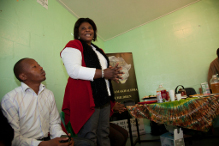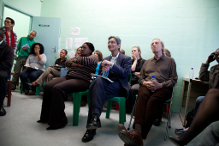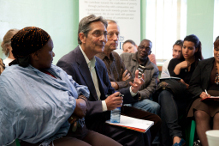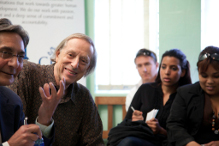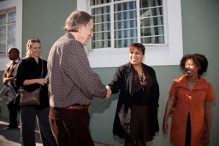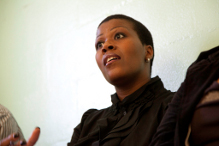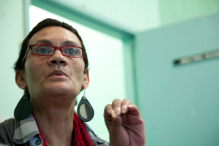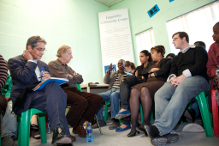
Community members discuss the factors that cause xenophobia
July 23, 2010 – International human rights activist, author and playwright Ariel Dorfman, who is in South Africa to deliver the Eighth Nelson Mandela Annual Lecture on July 31, today joined Nelson Mandela Foundation CEO Achmat Dangor, as well as African and international humanitarians, to take part in a social cohesion sharing session around the issue of xenophobia in the Western Cape.
The session was held at the Gugulethu Community Centre and served as an opportunity to listen to the recurring problems regarding xenophobia, which recently flared up again in township areas in the Cape and in the country at large.
Attended by implementing partners in the Social Cohesion community conversations programme in the western cape, there was a common feeling among those present that one of the main reasons for the xenophobic tension in the province was related to the economy: a large number of people continue to compete for limited resources and jobs.
But some also cautioned against over-simplifying the issue at hand, pointing out that historical and psychological factors add to the sense of displacement – physical and psychological – that both foreign nationals and South Africans experience.
Councillor David Tshambula, who was involved with peace-keeping efforts during the period of taxi violence in the Crossroads area in the 1990s, called on the government and police to do more to root out the perpetrators of xenophobic violence and threats.
“We as a government are responsible because we have the security structures in place,” he said, “and these are being paid for by the taxpayers. I think the intelligence unit should perform better. I ask myself whether action is taken against perpetrators. If not, who is responsible? Who should’ve acted before the incident? This poses a serious embarrassment to us as a country.”
“These are our brothers and sisters,” he added. “I don’t even want to refer to them as foreign nationals.”
Service delivery in the form of safety and security is not a one-dimensional issue, either, and corruption is perceived as being rife.
Said Bukiwe Tolbat of Catholic Welfare and Development (CWD): “We very much feel that we are not safe, and we feel that we must protect ourselves in whatever way. Police are not intending on protecting our brothers and sisters from the continent; the police cannot protect us and that’s why we have so many skollies [“criminals”] in the communities. We need to involve senior police officials in these discussions.”
Ken Mutuma, Nelson Mandela Foundation implementing partner, who was born in Kenya but moved to South Africa in 1991, questioned the need for people to be categorised according to their origins at all. “How long do you have to stay in a place to be recognised as part of it?” he asked.
Bonus Ndlovu of St Kizito Children’s Programme had this to say: “I’m speaking as a ‘temporary resident’ from Zimbabwe. What stands out for me is that people are looking for simple solutions to complex problems. Foreign nationals left their countries of origin looking for solutions: we voted with our feet. But here we are taking a complex issue and giving it a simple solution: ‘Let’s take them out and get our jobs back.’ It’s dangerous.”
For Nomvuyo Mabusela of the Woodstock Trauma Centre for Survivors of Violence and Torture, the issues revolve around questions of “individuality and co-existence. The words we use to describe [foreign nationals] – like makwerekwere [literally, “cockroaches”, this is a derogatory term for foreigners] and amaCongo [“the Congolese”] – and the fact that these words are said in our presence without us objecting … That is a dangerous indifference. I often will not reprimand somebody [for using those words] but I will walk away; I know I will not be protected should I say something.
“We are guaranteeing that the violence will never end because that’s how we are conditioning our children – with paranoia and violence,” she continued. “If, as South Africans, we can feel secure, then we can extend that confidence. But remember – who is policing? Is it not the same people who come from this cycle?”
Dorfman agreed: “The worst thing in the world is indifference.” He stressed that community engagement is key to stopping the violence. He urged those present to consider the question, “Who stands between victims and perpetrators?” The overwhelming answer is “an engaged community”.
Thandeka Teyise, a human rights peer educator at Africa Unite and former health journalist, pointed out that children do not grasp the scope and extent of their history. If they could understand the role that South Africa’s neighbours played in protecting our struggle activists, they would surely be closer to an inclusive and compassionate outlook.
“People are so inhumane,” she began. “And children do not know their history. The child who does not know where he comes from, how will he know what his future can hold? I feel that the government has failed us and we need the political will to go back to basics.”
Mutuma stressed that, “If anything is going to change in our country it’ll have to happen on two fronts. We have to recognise each other’s humanity on an everyday level, and we need strong leadership at the top levels. We can’t continue growing a sense of nationality at the expense of others.”
Dorfman, who lived in exile for 17 years, listened intently to the xenophobic experiences of those present and then offered that the solution to the problem might relate to changing perceptions.
“I know what it is like,” he said in reference to immigrants trying to settle in South Africa, who faced daily prejudice and abuse. He felt that if the perpetrators of xenophobic violence could be converted, they would be of better use changing the perceptions of others, rather than sitting in jail.
Dangor pointed out that many South African political heroes, such as Oliver Tambo, Thabo Mbeki and Nelson Mandela, had been hosted by other African countries during apartheid. He hopes that South Africans can show African immigrants the same level of hospitality.
“We need to start a campaign to embrace each others’ humanity,” Dorfman said, “and to use our compassionate imagination. After all, we all come from somewhere else. I refuse to believe that the majority of South Africans are xenophobic and, in fact, the ‘others’ are the ones who are hating!” The delegation agreed.
Dangor urged those present not to ignore the core issues. “There is an ingrained prejudice that goes beyond corruption. Can we work with you, and groups like this one, to collect these stories [of how ordinary citizens are embracing humanity]?”
Bea Abrahams,Nelson Mandela Foundation implementing partner, concluded that new stories are indeed essential. “We’ve created a romantic myth of South Africa and we’ve created our own narrative; a lot has been written about the veracity of this narrative. But it is possible to create an alternative narrative – and it’s important to do so for South Africa and for our [collective] memory. This is not an issue merely between migrant and local communities; it goes very deep.”
Reflections
“It’s a human thing: if I have confidence, I will excel. We need a guarantee that I have protection. In these conversations, people have issues they are scared to talk about. What is lacking is that guarantee, that confidence. But government visibility doesn’t build that confidence from within to excel.” – Mary Magdaline Tal, executive director, Whole World Women Association
“More important than delivering the [Annual] Lecture is meeting people like you to find out how you are solving problems that effect not only this community but the whole world.” – Ariel Dorfman, human rights activist, author, playwright
We need to look at the sense of belonging on both sides – foreign nationals and South Africans. There is a sense of anger that their belonging is being taken away from them. Where is this sense of belonging, and where can people get it? Often this sense of belonging is reflected in resources: a house, water and safety. But people are not looking inside – where is my inner sense of belonging?” – Ntombi Mcoyi, project manager at Africa Unite (After School and Orphans and Vulnerable Children Programme)
“There seems to be some kind of identity crisis: and there are a lot similarities between South Africans and foreign nationals. Our own people have been displaced in the Western Cape for many years and it continues today. If our people can’t feel anchored in communities, we wonder how they can extend acceptance to foreign nationals? There is a sense of erosion and foreign nationals represent some kind of threat, whether it’s real or imagined. It’s always fascinating how we overlook our similarities but focus on our differences.” – Nomvuyo Mabusela, Woodstock Trauma Centre for Survivors of Violence and Torture
